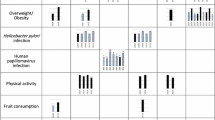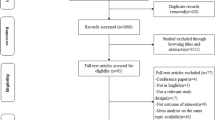Abstract
Purpose
This updated umbrella review aimed to evaluate the evidence regarding the associations between dietary factors and the risks of esophageal squamous cell carcinoma (ESCC) and esophageal adenocarcinoma (EAC).
Methods
The PubMed, Embase, Cochrane Library, and Web of Science databases were searched to identify relevant studies. The quality of the included meta-analyses was evaluated using A MeaSurement Tool to Assess systematic Reviews 2 (AMSTAR 2). For each association, the number of cases, random effects pooled effect size, 95% confidence intervals (CIs), heterogeneity, 95% prediction interval (PrI), small-study effect, and excess significance bias were recalculated to determine the evidence level.
Results
We identified 33 meta-analyses describing 58 dietary factors associated with ESCC and 29 meta-analyses describing 38 dietary factors associated with EAC. There was convincing evidence regarding the association of 2 dietary factors (areca nut and high alcohol) with the risk of ESCC. There was highly suggestive evidence regarding the association of only 1 dietary factor (healthy pattern) with the risk of ESCC. There was suggestive evidence regarding the association of 11 dietary factors with the risk of ESCC, including fruit, citrus fruit, vegetables, pickled vegetables, maté tea, moderate alcohol, hot beverages and foods, hot tea, salt, folate, and vitamin B6. There was convincing evidence regarding the association of one dietary factor (vitamin B6) with the risk of EAC. There was suggestive evidence regarding the association of 4 dietary factors with the risk of EAC, including processed meat, dietary fibre, carbohydrate, and vitamin B12. The convincing evidence regarding the associations between dietary factors and the risks of ESCC and EAC remained robust in sensitivity analyses.
Conclusions
This umbrella review highlighted convincing evidence regarding the associations of areca nut and high alcohol with a higher risk of ESCC. Additionally, an association between vitamin B6 and a decreased risk of EAC was observed. Further research is needed to examine the dietary factors with weak evidence regarding their associations with ESCC and EAC.




Similar content being viewed by others
Data availability
Not applicable.
Code availability
Not applicable.
Abbreviations
- EC:
-
Esophageal cancer
- ESCC:
-
Esophageal squamous cell carcinoma
- EAC:
-
Esophageal adenocarcinoma
- AMSTAR 2:
-
A MeaSurement Tool to Assess systematic Reviews 2
- CIs:
-
Confidence intervals
- PrIs:
-
Prediction intervals
- WCRF:
-
World Cancer Research Fund
- PROSPERO:
-
Prospective Register of Systematic Reviews
- MA:
-
Meta-analyses
- OR:
-
Odds ratios
- RR:
-
Risk ratio
- O:
-
Observed number
- E:
-
Expected number
- SFA:
-
Saturated fat
- MUFA:
-
Monounsaturated fat
- CaCo:
-
Case–control and cohort
- NA:
-
Not available
- NOS:
-
Newcastle–Ottawa quality assessment scale
References
Sung H, Ferlay J, Siegel RL et al (2021) Global cancer statistics 2020: GLOBOCAN estimates of incidence and mortality worldwide for 36 cancers in 185 countries. CA Cancer J Clin 71(3):209–249. https://doi.org/10.3322/caac.21660
Allemani C, Matsuda T, Di Carlo V et al (2018) Global surveillance of trends in cancer survival 2000–14 (CONCORD-3): analysis of individual records for 37 513 025 patients diagnosed with one of 18 cancers from 322 population-based registries in 71 countries. Lancet 391(10125):1023–1075. https://doi.org/10.1016/S0140-6736(17)33326-3
Morgan E, Soerjomataram I, Rumgay H et al (2022) The global landscape of esophageal squamous cell carcinoma and esophageal adenocarcinoma incidence and mortality in 2020 and projections to 2040: new estimates from GLOBOCAN 2020. Gastroenterology 163(3):649-658.e2. https://doi.org/10.1053/j.gastro.2022.05.054
Rumgay H, Arnold M, Laversanne M et al (2021) International trends in esophageal squamous cell carcinoma and adenocarcinoma incidence. Am J Gastroenterol 116(5):1072–1076. https://doi.org/10.14309/ajg.0000000000001121
Holleczek B, Schottker B, Brenner H (2020) Helicobacter pylori infection, chronic atrophic gastritis and risk of stomach and esophagus cancer: results from the prospective population-based ESTHER cohort study. Int J Cancer 146(10):2773–2783. https://doi.org/10.1002/ijc.32610
Abnet CC, Arnold M, Wei WQ (2018) Epidemiology of esophageal squamous cell carcinoma. Gastroenterology 154(2):360–373. https://doi.org/10.1053/j.gastro.2017.08.023
Coleman HG, Xie SH, Lagergren J (2018) The epidemiology of esophageal adenocarcinoma. Gastroenterology 154(2):390–405. https://doi.org/10.1053/j.gastro.2017.07.046
World Cancer Research Fund/American Institute for Cancer Research.Continuous Update Project expert report (2018) Diet, nutrition, physicalactivity and oesophageal cancer. Available from: https://www.wcrf.org/diet-activity-and-cancer/
Papadimitriou N, Markozannes G, Kanellopoulou A et al (2021) An umbrella review of the evidence associating diet and cancer risk at 11 anatomical sites. Nat Commun 12(1):4579. https://doi.org/10.1038/s41467-021-24861-8
Qin X, Jia G, Zhou X et al (2022) Diet and esophageal cancer risk: an umbrella review of systematic reviews and meta-analyses of observational studies. Adv Nutr 13(6):2207–2216. https://doi.org/10.1093/advances/nmac087
Moher D, Liberati A, Tetzlaff J et al (2009) Preferred reporting items for systematic reviews and meta-analyses: the PRISMA statement. BMJ 339:b2535. https://doi.org/10.1136/bmj.b2700
Veettil SK, Wong TY, Loo YS et al (2021) Role of diet in colorectal cancer incidence: umbrella review of meta-analyses of prospective observational studies. JAMA Netw Open 4(2):e2037341. https://doi.org/10.1001/jamanetworkopen.2020.37341
Neuenschwander M, Ballon A, Weber KS et al (2019) Role of diet in type 2 diabetes incidence: umbrella review of meta-analyses of prospective observational studies. BMJ 366:l2368. https://doi.org/10.1136/bmj.l2368
Shea BJ, Reeves BC, Wells G et al (2017) AMSTAR 2: a critical appraisal tool for systematic reviews that include randomised or non-randomised studies of healthcare interventions, or both. BMJ 358:j4008. https://doi.org/10.1136/bmj.j4008
Piovani D, Hassan C, Repici A et al (2022) Risk of cancer in inflammatory bowel diseases: umbrella review and reanalysis of meta-analyses. Gastroenterology 163(3):671–684. https://doi.org/10.1053/j.gastro.2022.05.038
WHO International Agency for Research on Cancer (2016) IARC monographs on the evaluation of carcinogenic risks to humans, vol 85. Betel-quid and areca-nut chewing and some areca-nutderived nitrosamines. Lyon, France: International Agency for Cancer Research (2016). Available from: https://monographs.iarc.who.int/list-of-classifications
PDQ Screening and Prevention Editorial Board. Esophageal Cancer Prevention (PDQ®): Health Professional Version. In: PDQ Cancer Information Summaries [Internet]. Bethesda (MD): National Cancer Institute (US) (2022). Available from: https://www.ncbi.nlm.nih.gov/books/NBK65955/
WHO International Agency for Research on Cancer (2023) IARC monographs on the identification of carcinogenic hazards to humans (2023) [updated 2023-03-24]. Available from: https://monographs.iarc.who.int/list-of-classifications
National Health Commission of the People's Republic of China. Oral health action plan (2019–2025) (2019). Available from: http://www.gov.cn/xinwen/2019-02/16/content_5366239.html
National Institute for Health and Care Excellence (2018) Oesophago-gastric cancer assessment and management in adults. (2018). Available from: https://www.nice.org.uk/guidance/ng83/documents/guideline-appendix
Kitagawa Y, Ishihara R, Ishikawa H et al (2023) Esophageal cancer practice guidelines 2022 edited by the Japan esophageal society: part 1. Esophagus 20(3):343–372. https://doi.org/10.1007/s10388-023-00993-2
National Comprehensive Cancer Network (2023) NCCN clinical practice guidelines in oncology-esophageal and esophagogastric junction cancers. (2023). Available from: https://nccn.medlive.cn/guide/detail/347
Liu X, Wang X, Lin S et al (2014) Dietary patterns and oesophageal squamous cell carcinoma: a systematic review and meta-analysis. Br J Cancer 110(11):2785–2795. https://doi.org/10.1038/bjc.2014.172
Abnet CC, Corley DA, Freedman ND et al (2015) Diet and upper gastrointestinal malignancies. Gastroenterology 148(6):1234-1243.e4. https://doi.org/10.1053/j.gastro.2015.02.007
He J, Chen W, Li Z et al (2022) China guideline for the screening, early detection and early treatment of esophageal cancer (2022, Beijing). China Cancer 31(6):401–436. https://doi.org/10.11735/j.issn.1004-0242.2022.06.A001
World Health Organization (2003) Diet, nutrition and the prevention of chronic diseases. World Health Organ Tech Rep Ser 916:i–viii, 1–149. Available from: https://iris.who.int/bitstream/handle/10665/42665/WHO_TRS_916.pdf
Nucci D, Marino A, Realdon S et al (2021) Lifestyle, WCRF/AICR recommendations, and esophageal adenocarcinoma risk: a systematic review of the literature. Nutrients 13(10):3525. https://doi.org/10.3390/nu13103525
McFadden DW, Riggs DR, Jackson BJ et al (2008) Corn-derived carbohydrate inositol hexaphosphate inhibits Barrett’s adenocarcinoma growth by pro-apoptotic mechanisms. Oncol Rep 19(2):563–566. https://doi.org/10.3892/or.19.2.563
Banda KJ, Chiu HY, Hu SH et al (2020) Associations of dietary carbohydrate and salt consumption with esophageal cancer risk: a systematic review and meta-analysis of observational studies. Nutr Rev 78(8):688–698. https://doi.org/10.1093/nutrit/nuz097
Khairan P, Sobue T, Eshak ES et al (2021) Association of dietary intakes of vitamin B12, vitamin B6, folate, and methionine with the risk of esophageal cancer: the Japan Public Health Center-based (JPHC) prospective study. BMC Cancer 21(1):982. https://doi.org/10.1186/s12885-021-08721-8
Swierz MJ, Storman D, Zajac J et al (2021) Similarities, reliability and gaps in assessing the quality of conduct of systematic reviews using AMSTAR-2 and ROBIS: systematic survey of nutrition reviews. BMC Med Res Methodol 21(1):261. https://doi.org/10.1186/s12874-021-01457-w
Lorenz RC, Matthias K, Pieper D et al (2020) AMSTAR 2 overall confidence rating: lacking discriminating capacity or requirement of high methodological quality? J Clin Epidemiol 119:142–144. https://doi.org/10.1016/j.jclinepi.2019.10.006
Piovani D, Danese S, Peyrin-Biroulet L et al (2019) Environmental risk factors for inflammatory bowel diseases: an umbrella review of meta-analyses. Gastroenterology 157(3):647-659.e4. https://doi.org/10.1053/j.gastro.2019.04.016
Kim TL, Jeong GH, Yang JW et al (2020) Tea consumption and risk of cancer: an umbrella review and meta-analysis of observational studies. Adv Nutr 11(6):1437–1452. https://doi.org/10.1093/advances/nmaa077
Graham PL, Moran JL (2012) Robust meta-analytic conclusions mandate the provision of prediction intervals in meta-analysis summaries. J Clin Epidemiol 65(5):503–510. https://doi.org/10.1016/j.jclinepi.2011.09.012
von Hippel PT (2015) The heterogeneity statistic I(2) can be biased in small meta-analyses. BMC Med Res Methodol 15:35. https://doi.org/10.1186/s12874-015-0024-z
Akhtar S (2013) Areca nut chewing and esophageal squamous-cell carcinoma risk in Asians: a meta-analysis of case-control studies. Cancer Causes Control 24(2):257–265. https://doi.org/10.1007/s10552-012-0113-9
Andrici J, Eslick GD (2013) Maté consumption and the risk of esophageal squamous cell carcinoma: a meta-analysis. Dis Esophagus 26(8):807–816. https://doi.org/10.1111/j.1442-2050.2012.01393.x
Chen Y, Tong Y, Yang C et al (2015) Consumption of hot beverages and foods and the risk of esophageal cancer: a meta-analysis of observational studies. BMC Cancer 15(1):449. https://doi.org/10.1186/s12885-015-1185-1
Islami F, Fedirko V, Tramacere I et al (2011) Alcohol drinking and esophageal squamous cell carcinoma with focus on light-drinkers and never-smokers: a systematic review and meta-analysis. Int J Cancer 129(10):2473–2484. https://doi.org/10.1002/ijc.25885
Islami F, Ren JS, Taylor PR et al (2009) Pickled vegetables and the risk of oesophageal cancer: a meta-analysis. Br J Cancer 101(9):1641–1647. https://doi.org/10.1038/sj.bjc.6605372
Liu J, Wang J, Leng Y et al (2013) Intake of fruit and vegetables and risk of esophageal squamous cell carcinoma: a meta-analysis of observational studies. Int J Cancer 133(2):473–485. https://doi.org/10.1002/ijc.28024
Luo H, Ge H (2022) Hot tea consumption and esophageal cancer risk: a meta-analysis of observational studies. Front Nutr 9:831567. https://doi.org/10.3389/fnut.2022.831567
Qiang Y, Li Q, Xin Y et al (2018) Intake of dietary one-carbon metabolism-related B vitamins and the risk of esophageal cancer: a dose-response meta-analysis. Nutrients 10(7):835. https://doi.org/10.3390/nu10070835
Zhao W, Liu L, Xu S (2018) Intakes of citrus fruit and risk of esophageal cancer: a meta-analysis. Medicine (Baltimore) 97(13):e0018. https://doi.org/10.1097/md.0000000000010018
Huang W, Han Y, Xu J et al (2013) Red and processed meat intake and risk of esophageal adenocarcinoma: a meta-analysis of observational studies. Cancer Causes Control 24(1):193–201. https://doi.org/10.1007/s10552-012-0105-9
Sun L, Zhang Z, Xu J et al (2017) Dietary fiber intake reduces risk for Barrett’s esophagus and esophageal cancer. Crit Rev Food Sci Nutr 57(13):2749–2757. https://doi.org/10.1080/10408398.2015.1067596
Xuan F, Li W, Guo X et al (2020) Dietary carbohydrate intake and the risk of esophageal cancer: a meta-analysis. Biosci Rep 40(2):BSR20192576. https://doi.org/10.1042/BSR20192576
Funding
This work was supported by grants from the National Natural Science Foundation of China (Grant No: 81874277).
Author information
Authors and Affiliations
Contributions
The authors’ responsibilities were as follows—LF and ZXR: contributed to the umbrella review design; ZXR, ZXT, and GR: conducted the literature search, extracted the data, and conducted the analyses; ZXR and WYJ: wrote the first draft of the manuscript; WT and ZZP: review and editing; ZLY, LQM and ZYJ: visualization; LF is the guarantor of the paper. All authors have read and agreed to the published version of the manuscript.
Corresponding author
Ethics declarations
Conflict of interest
The authors declare no conflicts of interest.
Supplementary Information
Below is the link to the electronic supplementary material.
Rights and permissions
Springer Nature or its licensor (e.g. a society or other partner) holds exclusive rights to this article under a publishing agreement with the author(s) or other rightsholder(s); author self-archiving of the accepted manuscript version of this article is solely governed by the terms of such publishing agreement and applicable law.
About this article
Cite this article
Zhang, X., Zheng, X., Gao, R. et al. Role of diet in the risks of esophageal adenocarcinoma and squamous cell carcinoma: an updated umbrella review. Eur J Nutr (2024). https://doi.org/10.1007/s00394-024-03393-z
Received:
Accepted:
Published:
DOI: https://doi.org/10.1007/s00394-024-03393-z




